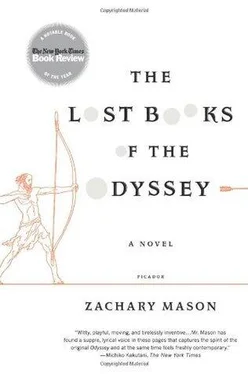Menelaus passed his days in the citadel, reading Death’s book and walking his halls. When the moon shone just so on his great black throne there sometimes came a clattering from below and a white, pure light would shine up through a grating in the floor. In a bubbling voice with just the barest trace of her old music Helen would then speak to him, telling him the gossip of the underworld that was now her home, of the basements and dungeons stretching down below the city, the extremities of whose depths were even for her just a rumor. So Menelaus had his wife, though he never set eyes on her, and his revenge, though not by his own hand, and his enemy’s throne, though it was a terrible one. In due course he set out to add to his kingdom.
As for Odysseus, he slipped out of the city during the sack and took ship for Ithaca alone. He had hoped for a quick passage home but found himself opposed by strong winds and thick fogs. He found many islands but all were abandoned.
He was walking through still cold water toward a grey beach when Quickness appeared to him for the last time. She floated in the air, naked now and taller (he had never seen her naked before — she was as well made as he had imagined but seemed to have somehow moved beyond beauty or its absence), and sparks glowed in her hair. She touched his face (somehow he could not imagine her talking now). She looked viciously happy. Her eyes met his and then she disappeared and he was left wondering.
*In the eighteenth century B.C. there was a thriving cult of the goddess Quickness, known for virginity, quick thinking, harsh laughter and an association with owls. Her particular enemy was Death, with whom she had fought a number of inconclusive wars, her object in which seems to have been eradicating his kingdom and ushering in an era of immortality. Her cult was immensely popular but such was the ruggedness of montane Greece that it soon speciated into a dozen subgenera. By the twelfth century B.C. her incarnation as Pallas Athena had displaced all others and is now remembered to the exclusion of her sisters. Quickness was a more lively goddess than Athena, open to human sacrifice and, in contrast with her sister, as much a user and a predator as a lover of heroes.
*At the time, Achaean men would marry around fifteen and Achaean women around twelve, so this would be well into his married life.
*Upon returning from the Trojan War, Agamemnon was murdered by his wife, Clytemnestra.
Years before the Trojan War, King Tyndareus decided it was time to marry off his daughter Helen and, as she was the same age, her cousin Penelope. Penelope was fair but Helen, who was actually the daughter of Zeus, though no mortal but her mother knew it, had beauty that broke men’s wills. Upon hearing of Helen’s impending introduction to society, the flower of Achaea’s bachelorhood descended on Tyndareus’s palace to court his favor and (since he was an indulgent father) his daughter’s. Odysseus, young and ambitious, came all the stormy way from Ithaca to win her, but when he arrived and saw the throng of suitors surrounding the girls he knew that for all his skill in war and presence of mind, his kingdom was small and poor, and more eligible princes abounded. Pensive, he haunted the periphery of the hall where Helen suffered gentlemen to wait on her and racked his mind for a stratagem. He was distracted by the braying laughter of Menelaus, a thick-headed bully whose ill breeding was evident in the offhand contempt with which he treated Penelope, who hovered near him, her eyes fixed on his face, filling his wine cup and laughing at jokes intended for Helen.
“I must have Helen or die,” Odysseus thought, “though she does not seem like the sort of thing that can be had. More like a raptor, bright-eyed, poised over the world, inaccessible, rarely descending, swiftly striking. It would be worth my life to get her.” Just then Mentor, Odysseus’s father’s man who had come with him from Ithaca, appeared as though from out of a mist and pulled him aside. Eyes shining, Mentor said he had noticed that though every man was smitten with Helen and could scarcely tear his eyes from her face, no two of them described her the same way. This effect was so pronounced that they might have been describing different women altogether. For Agamemnon she was wide-hipped, cow-eyed, faithful and slow. For Themistocles she was a wild thing of volatile moods and for Idomenos a giddy, vapid admirer of his seamanship, and so on. *Not only that but when she was not immediately before them her suitors were hard-pressed to remember anything about her at all — he had found that when Helen was out of sight her suitors could not even recall the color of her hair, although they accepted any suggestion given to them. Menelaus the Spartan was the only one who was not smitten with her — he seemed to desire her because she was considered desirable and only the best wife was consistent with his dignity. Odysseus, skeptical, tried to remember her face and failed. A plan formed and in his preoccupation he did not notice when Mentor vanished in a rushing of wings. *
That night Odysseus climbed up the wall of the palace garden through thick perfumed air and into Penelope’s bedroom. She regarded him morosely, dull-eyed and indifferent at the prospect of ravishment. Odysseus sat beside her on her bed, put an arm around her shoulders and asked in a conspirational whisper how would she would like to have Menelaus for a husband. Penelope replied with the clarity of depression that she would like it above all things but that no one could compete with Helen. Odysseus said, “I will get you what you want, and as for Helen she will get a husband who is a much better man than Menelaus.”
The next morning Tyndareus’s valet brought him a note that had been found in the banquet hall. It was from Helen, informing him that she had fallen in love with Menelaus, prince of Sparta, and had asked him to carry her away that night, this being the only sure way of getting the husband she wanted. In a postscript she conveyed her kindest regards to the other suitors. As the young men grumbled over this effrontery the rumor spread that Penelope, the plain one, had also eloped, going off with an obscure island-lord. Tyndareus sat fuming until he realized that both his wards were in advantageous marriages, that he had not paid a single copper in dowry and that no one could say a word against him.
On Ithaca, Odysseus’s bride was his delight and for her part she did not seem to mind him, though she would never let him see her undressed. In Sparta, Menelaus was happy because he had what everyone else wanted. For the first few months of their marriage his wife adored him, but soon even she found him odious. He reciprocated her dislike and, still loath to let anyone else so much as see her, kept her sequestered in his palace.
When the glib and handsome Prince Paris visited the Spartan court, Penelope, who was permitted out of the women’s quarters for state occasions, was easily seduced, absconding with him not so much for love as in hope of any other kind of life.
In due course Agamemnon and Menelaus came to Ithaca and demanded that Odysseus muster his forces to sail with them to recapture Helen. Odysseus longed to explain the joke and tell them to forget about their war and go home somewhat the wiser, but he saw their grim faces and their warships in the harbor and knew he would not long survive that revelation, so he went home and kissed Helen goodbye, waiting to see if she would kiss him in return (he had lived with her for years by then but had not yet made up his mind whether she liked him, nor had he learned to read her face), and then got his arms to go to the war that he hoped would end by summer’s reaping.
*Helen, though mortal, was more god than not. The ichor of her father Zeus had bred truer in her than in any of his other mortal scions; in consequence of her fractional godhead, no mortal man could look upon her without being burned away, until Zeus took pity on her (and perhaps on the Achaeans) and hid her behind a veil that occluded most of her nature — any man looking at her would see the epigone of feminine beauty as he conceived it, and almost nothing of who she really was (in so far as she was anyone at all).
Читать дальше












